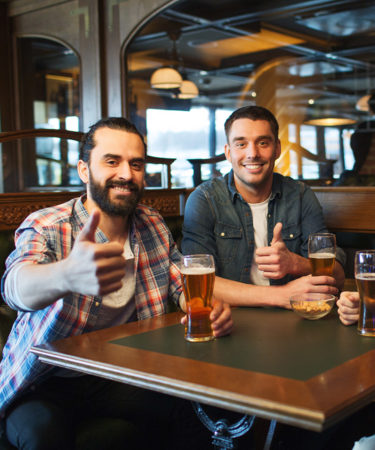The show Cheers, for those of you who remember it, always seemed a bit like wishful thinking. For those of you that don’t remember it, it was a sitcom about a semi-dive bar in Boston. Characters included ex Red Sox pitcher-turned-bar owner Sam, uptight love interest Diane (giving Shelley Long some of the only opportunities for sexual chemistry in her entertainment career), Woody (Woody Harrelson, who went on to do some stuff, we think?), Rhea Pearlman as cantankerous waitress Carla, and a cast of regulars: Cliff Claven, know-it-all mustachioed mailman, Norm—the mensch working man of the crowd, and Frasier and Lilith, a cartoonishly tightly wound couple who, for some reason, loved to hang around an entirely frills-free bar. (And yes, both of those actors also went on to do some stuff.)
What made Cheers unrealistic wasn’t that no one ever went to the bathroom. It’s that all these characters hung out in a bar, day after day, and nobody seemed to sink into a downward spiral of alcoholic depression. (Unless there was a “Woody: The Dark Years” spinoff none of us knew about.) To be fair, Frasier first showed up as a psychiatrist character to help Sam cope with his returning alcoholism—what got him kicked out of baseball—and the departure of Diane, who presumably left for the library-shusher job she was always meant for.
Except Cheers had it right. According to a UK-based study called “Friends on Tap” by the Campaign for Real Ale (AKA “CAMRA”), people who regularly go to pubs actually end up happier, and potentially healthier, than the rest of us. The study was actually run by the Department of Experimental Psychology at Oxford, and starts with the reasonable premise that “conversation lies at the heart of sociality.” Their goal: “to see whether there were any differences in the patterns of conversation between small community pubs and large (mainly city centre) pubs and bars,” which is to say larger urban bar settings where general anonymity and sleek, rapid-fire alcohol are the order of the day.
What the Oxford study shows, roughly speaking, is that at the venue of the local pub, wherein socializing is the norm (“Norm!”) and familiarity exceeds anonymity, you’re actually going to end up drinking in a healthier way than you might at home, alone, watching Cheers. Of 2254 people surveyed, 22% said they had a regular “local” pub, but among the 41% of drinkers who regularly attend a pub, they regard it “as a relatively safe place to drink (and avoid binge drinking),” as well as “the best place to socialize with friends.”
It seems a bit inverse, since we’ve all done some of our most chaotic and/or sportsman-like drinking with our friends. “Oh yeah? You think YOU can drink the most white zin during ‘Hello’???” But, per Oxford (coolest phrase ever), “it seems that there can be a group-moderation effect.” As they put it, “the group acts as its own policeman.”
More good news. The “local bar” responders not only reported “being significantly happier, feeling more trust in other people, and having greater life satisfaction than those who did not report having a local” [bar], but the local bar folks tended to have more friends they felt they could go to in a crisis.
Not that folks without a local pub responded by quoting Sartre. They equaled the pubbers on levels of general anxiety (or lack thereof) and “how worthwhile” they found their life activities. If you want to see their list of pub-based conclusions, check out page 45. Meanwhile, next time you drink in the big city, remember that quantity of friends and quantity of drink do not happiness make. Like the song—and a bunch of grinning English people say—you want to go where everybody knows your name.
